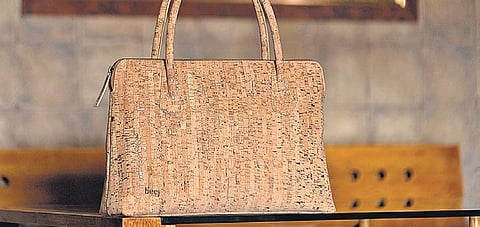

"From the moment an idea is scribbled in a notebook to when it’s delivered to your door – Beej strives to make responsible choices at every step," says Beej founder Arundhati Kumar. Launched this year, the brand makes accessories such as bags, wallets, laptop and iPad sleeves using sustainable materials.
Kumar adds, "Pinatex is one of the several plant-based materials that we work with in the studio. It is water resistant, vegan, 90 per cent biodegradable and manufactured with a very low environmental impact. We procure it from Ananas Anam that sources raw materials from the Philippines. They work with rural farming communities and farming cooperatives to create an additional source of income for the pineapple farmers."
Piñatex is a patented natural non-woven textile made from the leaves of the pineapple plant by Ananas-anam that is based out of Spain and headquartered in London. "The leaves of the plant, and not the fruit are processed to extract the fibres and these are manufactured into a non-woven substrate," she adds.
What excited her about the material was not that it’s vegan but the low environmental impact across the manufacturing process. "It’s literally made from agricultural waste. I, then, saw the material samples. It has a very distinct texture and lends itself beautifully to accessory design," she says.
Beej also works with Desserto – another plant-based leather alternative that comes from Mexico and is made from the pulp of the Nopal cactus. Another material, Cork leather that is made from the bark of the cork oak tree is also being used.
"Apart from these, Khesh is the latest material we’ve added to our lists. It’s an upcyled handloom material that comes from Shantiniketan, West Bengal and is made by upcycling old cotton sarees that are rewoven," she adds.
Sustainability is not a single action or mere lip service for Beej, but a filter they apply to every decision. When it comes to packaging, Beej sticks plastic- free and zero-waste packaging. "Products come in an upcycled, reusable box, which can be used in several ways. Made using seed paper, even the product information card is made with thoughtful care to ensure they throw nothing away," Kumar says.
MAKING OF PIÑATEX
After pineapple harvest, plant leaves that are left behind are collected and the long fibres are
extracted using semi-automatic machines.
Fibres are then washed and dried. Then they go through a purification process resulting in a fluff-like material.
This material is mixed with a cornbased polylactic acid (PLA) and undergoes a mechanical process to
create Piñafelt, a non-woven mesh forming the base of all collections.
The rolls of Piñafelt are then shipped from the Philippines to Spain or Italy for finishing.